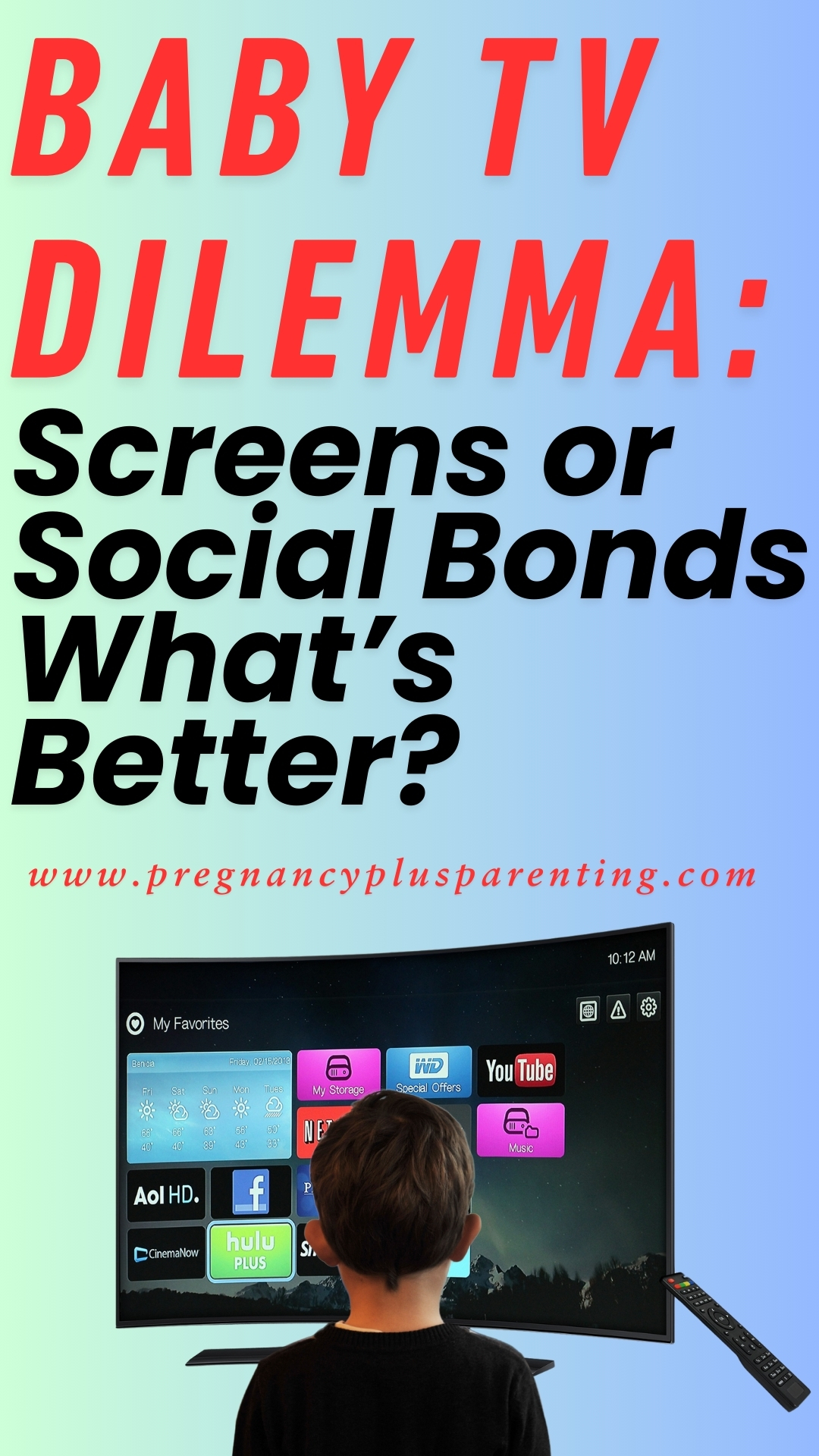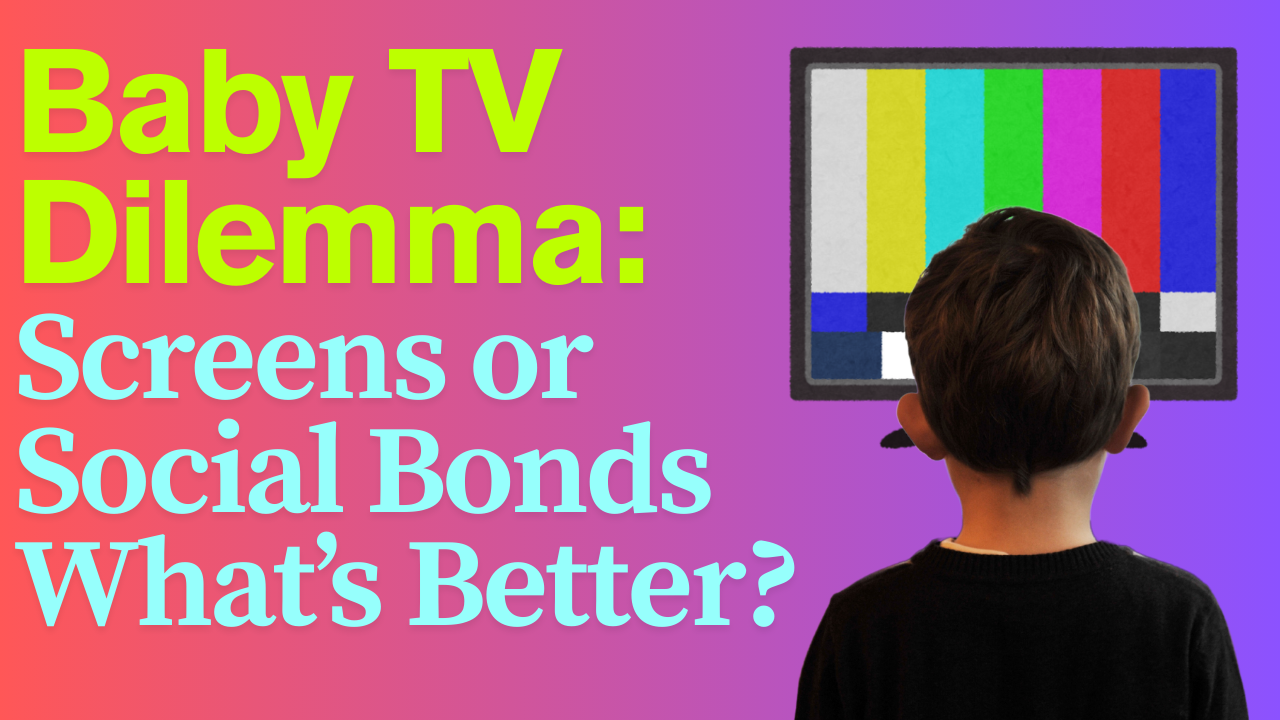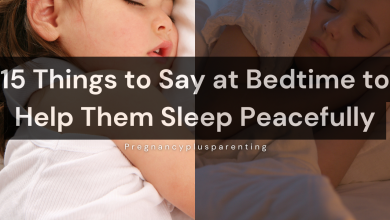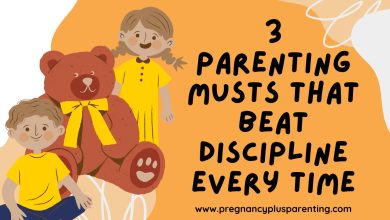Baby TV Dilemma: Screens or Social Bonds – What’s Better?
Can a baby watch television?
One of the most controversial questions in our everyday lives may not have been asked by anyone yet, but you have probably stumbled across the topic of screen time and are wondering what it is all about.
More and more parents are receiving dirty looks and harsh comments in public when they let their little babies “be entertained” by their smartphones while they calmly drink their coffee or even stare at their own smartphones.
But is there really anything wrong with it? Is television and excessive media consumption actually making our children stupid?
Are the television, the smartphone and the radio really the culprits that are putting obstacles in the way of our children and their development?
Is it true that the negative effects of too much screen time for babies and toddlers range from shorter attention spans to less empathy?
We know that most of a baby’s brain development takes place in the first two years of life.
That’s why it’s so important for babies and toddlers to explore their surroundings.
Babies explore and experience the world through sight, hearing, taste and touch.
In addition, interacting and playing with other children helps them learn about the world around them.
There are now also many recommendations from various experts who advise limiting the time babies and toddlers spend in front of a screen.
The Federal Center for Health Education (BzgA), the American Academy of Pediatrics (AAP), the World Health Organization (WHO) and the Federal Ministry for Family Affairs, Senior Citizens, Women and Youth (Bmfsfj) agree and warn against excessive television consumption .
They advise that babies and toddlers should not be exposed to any media until they are 3 years old, and especially not without supervision and without supervision.
And while this is good advice, in today’s world it is very difficult to keep babies and toddlers away from television, tablets, computers, smartphones, etc.
Nevertheless, more and more parents are concerned with the question of whether babies are allowed to watch television.
There is a great deal of uncertainty, which is actually quite natural.
Because most of us have no personal experience with it and cannot report from our own childhood what it did to us, because we all grew up without smartphones, tablets, etc.
But before you give in to today’s technology and media-driven world and use screens to entertain or distract young children while you juggle other activities or errands, you should look a little deeper into your baby’s brain.
Because let’s face it, screens capture the attention of babies and toddlers while you have plenty of time to do something else or take a breather.
But in this article I would like to present the influence that television consumption has on babies and their brains and how much screen time is suitable for which toddler age.
There are now enough studies on media consumption and its effects on babies and toddlers and parents need to be educated about the importance of offering babies and toddlers experiences that do not involve “screens”.
In early childhood, nerve cells connect with each other and nerve connections that are used stabilize and those that are not used atrophy.
That’s why the variety of senses stimulated during growth is so important, because this is how everything in the brain is naturally connected.
This means that this is the only way children can learn to improve their social and cognitive skills and be healthier and happier in the future.
And dear parents, this topic is important, even more important than finding the best stroller , completing the initial equipment or buying the most expensive baby bouncer .
Because it is about the future of your children and the future of the entire world.
Media consumption among babies and toddlers under 3 years of age
Media of all kinds have taken over and we can no longer imagine everyday life without them.
Radio, laptop, tablet, DVD player, smartphone and television play a major role in everyday life.
What may not be an obvious problem, but has crept into almost every household, is the fact that relationships of all kinds suffer from excessive media consumption.
If you can imagine that the influence of the television can create an unpleasant atmosphere in a household without a baby, then you can only imagine how the situation changes with a baby.
Because how you behave in front of the television and other screens, how much influence they have on you and how you use them no longer affects you and your partner alone, but now your media behavior affects your baby.
Are you a mom who is constantly texting or making phone calls on her smartphone?
Do you use a tablet while breastfeeding or watch TV at the same time?
This is all the power of habit, which is not easy to break, but how does it all affect your baby?
How does the constant flood of media affect your baby’s development?
What is going on in that little brain while it is exposed to the television?
In the interest of your baby and all children out there, the least we can do is address the question “Should a baby be allowed to watch television?” and critically examine our own media behavior.
Can my baby watch TV?
The baby is here and suddenly your daily routine is disrupted and you have to coordinate everything around your baby.
It’s not an easy task, because now you have no time for yourself and 5 minutes in the bathroom without hearing the baby cry seems like a luxury.
To ensure you have some alone time, you turn on the TV as a babysitter and enjoy the peace and quiet while giving yourself a breather.
According to surveys, many families in Germany assume that television is harmless for a baby.
But is that true? Does television really have no negative impact on your baby? Can a baby even actively watch television?
It is clear that the television initially attracts babies almost like a magnet and the little ones stare at the flickering box as if spellbound.
However, various studies have found that the small brains of babies and toddlers are overwhelmed by this.
The fast flickering images, the different sounds, the many colors and unfamiliar figures lead to a complete sensory overload in babies and toddlers.
The thing is, the little brain is not able to process what it sees, which in turn leads to confusion.
Children can only perceive actively if they engage with and participate in something with all their senses.
Participating means that they have to be active themselves, rather than being flooded with different sounds and images from a dead device.
Beware of the trap! The TV is on in the background when the baby is in the room.
It is a normal part of everyday life for the television to be constantly running in the background while the whole family goes about their own business without actually noticing what is being offered on television.
In many families, the television is in the same room where the children play, where the baby is fed, where the bassinet is, or where the baby spends time in its playpen.
But how does the “unobtrusive” television running in the background actually affect children’s development?
There is a strong belief that babies need background noise and that they don’t like silence at all.
But are white noises, the sounds of a vacuum cleaner and the like the same as the television being on?
Studies have shown that a television constantly running in the background is a distraction for babies and children and that it distracts children who are playing.
If your child plays in front of a TV, they will be constantly distracted, meaning they won’t be able to concentrate on playing and will play for significantly less time.
Babies who are unintentionally or unconsciously exposed to the flickering screen and the flickering images are at risk of sensory overload because they cannot process the colorful images, sounds and other stimuli.
If you have the TV on in the same room while your baby is sleeping, the constant sound and flickering light can interrupt and disturb your baby’s sleep.
All this means that normal everyday noises are not considered or perceived as disturbing by babies, whereas a switched-on television is perceived as a disturbance.
And besides, if you fall into the trap and allow yourself to be seduced by the flickering images, you will waste precious time on an unimportant program when you could be using it to spend time with your baby.
Is watching television harmful for babies?
Brain research agrees that regardless of the program offered to babies, there is a risk of negative influence on the healthy mental development of young children.
Nevertheless, surveys show that parents claim to want to do something good for their babies and toddlers by allowing them to watch “special programs” for toddlers.
The fact is that the small brain needs immediate feedback in order to achieve a learning effect, but an overload of images accompanied by loud noises does not require a response and thus negatively affects the child’s later mental and physical development.
An infant who is left in front of the television all day without the opportunity to explore his or her surroundings and his or her own abilities is particularly at risk.
The results of brain research also show that babies and toddlers can only benefit from experiences and things that they themselves experience holistically with all their senses.
In order to be able to classify experiences and the environment, babies and toddlers need to be able to feel things around them so that they can classify them and draw conclusions.
For example, the retina of a baby’s eye produces a similar image of a shadow and the edge of a table.
Only when the baby is able to touch the edge of the table and also perceive it with other senses (in this case touch) will it learn to distinguish a shadow from an edge.
Next time, the little brain will be able to visually recognize the difference because it achieved a learning effect by scanning and feeling the edge of the table.
When watching television, such holistic sensory perception is missing, which can have harmful consequences for the healthy development of the small brain.
Does television make you stupid? What does research say?
Although it is a widespread opinion that television is good for babies and toddlers, one still wonders whether television might actually make them stupid.
This question is also addressed by many studies investigating how television consumption affects children’s later development, and research from all over the world has come to similar conclusions.
Excessive television and media consumption in infancy and early childhood have negative effects on language development and later school performance.
In the USA, a study was conducted on toddler groups from English-speaking families. One group was read stories in Chinese, while the other group was shown the same stories on television.
After two months, it was found that children who were read to in Chinese were able to distinguish sounds in the same way as children from Chinese families, while the group who were shown the same stories on television had not learned anything.
Another study conducted in Canada showed that excessive television viewing has a negative impact on psychological and cognitive development, which was clearly noticeable later in school age.
This study was conducted on 1,000 two-year-old children, where parents tracked how much television their children watched for two years.
Later, at the age of 10, her academic performance was evaluated by doctors and teachers.
This study showed that every half hour of additional television or media consumption during infancy and toddlerhood was associated with poorer school performance later in life.
In addition, children exposed to heavy television consumption were also repeatedly bullied and had a more inactive lifestyle than babies and toddlers, compared to those whose media consumption was restricted or even prohibited.
Studies also show that children who are read to have a significantly richer vocabulary when they start school than children who were exposed to television and were not read to.
Another interesting study from New Zealand, which was conducted on 1,000 children and followed them up to the age of 35, found that early childhood television consumption played a role in academic careers, regardless of their social class.
Namely, 40% of children who were allowed to watch television for half an hour a day later graduated from university, while only 10% of children who were bombarded with television for several hours a day also achieved the same result.
Are illnesses like ADHD and media consumption connected?
An important subject of various scientific studies is the connection between excessive television consumption at a young age and diseases such as ADHD (ATTENTION DEFICIT/HYPERACTIVITY DISORDER).
The results are clear! Children who were exposed to high levels of television consumption as toddlers and were unable to process the flood of images later had problems with concentration and attention in school.
The flickering colorful images and the flickering light arouse the child’s interest and prevent them from playing independently, and the child does not even have the opportunity to pursue any other activity.
In addition, the lack of exercise leads to obesity, which in turn becomes a reason for teasing and bullying at school, and the child, suffering as a result, withdraws back to their own room and is repeatedly drawn into the spell of the media.
This is a vicious circle that is difficult to break and unfortunately many children never manage to learn how to concentrate on a game or book because they are unable to control their attention.
Excessive television consumption is associated with sleep deprivation due to sensory overload, delayed language development and a lack of empathy.
This unhealthy lifestyle in front of the television in toddlerhood is the cause of lack of concentration, hyperactivity and obesity.
These are all habits that are difficult to break and are established in early childhood, when the small brain is developing and one’s own behavior is formed, through excessive television consumption.
Can excessive media consumption lead to sensory overload?
If you observe the world around you, you will quickly notice that we are surrounded by various stimuli that we perceive consciously or unconsciously with all of our senses.
A baby experiences many of these stimuli for the first time, such as the smell of the meadow, the sound of the church bells, the color of the sky or how the new pillow feels.
As an adult, you perceive many things unconsciously and no longer realize that the world around you is full of stimuli that now, as an adult, seem uninteresting and unimportant to you.
But there are also people who, as adults, have problems switching off and finding peace because they cannot concentrate on what is important.
The thing is, young children want confirmation, or more precisely, feedback, about what they hear, see, or feel, in order to know whether it is something good or not.
When the baby hears the church bells for the first time and mom smiles at him, he gets confirmation that it is a good sound, so that next time he will know not to be afraid.
It is also specific to young children that it takes time and repetition until they learn something, process it, and classify it.
Nighttime sleep is so important because babies and toddlers use sleep to process and classify new impressions and stimuli.
Small children who are exposed to smartphones, tablets, televisions, etc. have less sleep, which in turn means they cannot process “new” information and suffer from sensory overload, which in turn prevents them from sleeping.
A vicious circle that must be broken at all costs, because the small brain cannot process the many colors, different voices and figures and fluctuating images as quickly as they are spat out at it.
Logically, there comes a point where the baby or toddler can no longer keep up and becomes desperate.
It continues to stare at the television, but becomes restless, cries, is tired and generally dissatisfied.
In such a case, sleep is not in sight and this dissatisfied, overwhelmed and sleep-deprived baby is put in front of the television the next day because the parents are annoyed and tired and cannot do anything with him.
A dangerous circle with no end in sight.
Official recommendations for media consumption for babies and toddlers
Numerous studies have shown that the development of children aged 0 to 3 is at risk from excessive television consumption and have very clear recommendations for this target group regarding media consumption.
Screens should be taboo for all children until the age of three, because the small brain is at its most sensitive during this time and all important cognitive and motor skills are developing.
Only by keeping your child away from television can you prevent later consequences such as delayed language development and poorer school performance and provide them with enough activities to promote their motor skills and concentration.
It is important to note that it is impossible to reverse the losses and damage caused by excessive television consumption at a young age.
Which media are beneficial for babies and toddlers?
Little babies love listening to their mother’s voice, but they also enjoy listening to other voices and music and observing everything that is happening around them.
It is important that not too much happens at once so as not to overwhelm the baby and toddler.
Picture books are a great way to get started with the world of books, and although little ones don’t become actively interested in them until around the seventh month of life, you can start reading aloud or telling stories much earlier.
And it doesn’t matter how many weeks old your baby is, because as already mentioned, babies love to listen, which later has a positive effect on a rich vocabulary and better language development.
Read to your baby or toddler as often as possible, even the same thing, because repetition is necessary for babies.
Repetitions promote a learning effect in babies; they help the little earthlings to process and classify the many stimuli.
If you don’t have time to read aloud, don’t be afraid to listen to audiobooks. A CD has the advantage of allowing you to play the same section over and over again, and the same story can be listened to countless times.
However, audio books and picture books are just some of the many age-appropriate toys that can promote your child’s motor and cognitive skills.
There are many Montessori toys and other toys that allow you to actively and meaningfully use your time with your children, so with a little creativity you are sure to come up with an activity idea instead of simply leaving your child in front of the television.
Playing together will not only strengthen your bond, but you can also explain many things to your child, resolve any insecurities, and raise your little one to become an independent and self-confident adult.
Final thoughts
As with so many other things in life, the dose is crucial and plays a big role.
Too much of a good thing is not always good and the same is true with television.
I am convinced that television cannot do any good for a small baby or toddler, but I am only human.
As you have seen, there are now many studies that deal with extreme cases and the fact is that babies and toddlers up to the age of 3 cannot do anything with these sequences of images.
If you let your baby sit in front of the television all day, you are deliberately depriving him of the opportunity to develop naturally and healthily.
But as with so many other things in motherhood, you don’t have to be hard on yourself.
We all have good days and not so good days, and sometimes we have more time, sometimes less. If you’ve spent the whole day outside playing and you let your baby watch Sandmännchen with the older sibling, it doesn’t necessarily mean that your child will suffer any damage.
Advice is one thing, but reality is usually quite different and television cannot be completely avoided.
It is important that you avoid it as often as possible and try to calm your baby with other things, such as a pacifier, instead of pressing a button on the remote control.
I hope you have fun playing and exploring the countless activities you can do without a television.







